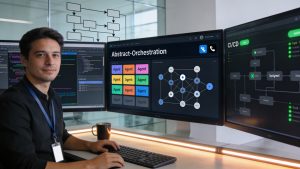Spotify, widely recognized as a leader in music streaming, has quietly built a significant presence in developer tooling through its open-source platform, Backstage. Since its release in 2020, Backstage has transformed how organizations manage their internal developer portals (IDPs), enabling more than two million developers across 3,400 companies-including industry giants like Airbnb, LinkedIn, Twilio, and American Airlines-to streamline their engineering workflows.
What is Spotify Backstage?
Backstage is an open-source platform designed to unify all infrastructure tooling, applications, data, APIs, and documentation within a single, customizable interface. This centralized approach addresses the common challenge of “infrastructure chaos” by providing a single source of truth for developers. Backstage’s extensible plugin architecture allows teams to integrate their existing tools, monitor Kubernetes, track cloud costs, manage CI/CD pipelines, and much more-all from one portal.
Key Features and Benefits
- Centralized Software Catalog: At the heart of Backstage is its software catalog-a centralized repository that helps teams organize, discover, and manage software components, services, and their metadata. This catalog enhances visibility, ownership, and discoverability across engineering teams, reducing silos and supporting more efficient collaboration.
- Documentation Hub: Backstage’s TechDocs plugin enables engineers to write and maintain technical documentation as Markdown files stored alongside their code. This integration simplifies the process of keeping docs current and accessible, fostering a culture of collaboration and knowledge sharing.
- Plugin Architecture and Customization: Backstage’s plugin-based design allows organizations to extend its functionality to fit their unique needs. Teams can build custom plugins or leverage a growing ecosystem of open-source and premium plugins to integrate with existing tools, automate workflows, and enhance developer experience.
- Improved Developer Productivity: By consolidating tools, documentation, and services into a unified portal, Backstage reduces the cognitive load on developers. This streamlined approach accelerates onboarding, boosts productivity, and enables teams to focus on building software rather than navigating complex toolchains.
Spotify’s Commercial Offerings: Portal and Premium Plugins
While the core Backstage platform remains open source, Spotify has expanded its developer tooling business with premium offerings. In 2022, the company introduced paid plugins like Backstage Insights, providing organizations with advanced analytics on Backstage usage. More recently, Spotify announced the Spotify Portal for Backstage-a fully managed SaaS version aimed at organizations seeking a turnkey solution without the overhead of self-hosting and maintenance.
The managed Portal is moving toward general availability, with early adopters including the Linux Foundation and PagerDuty. This “Backstage in a box” approach makes it easier for organizations of all sizes to implement best-in-class internal developer portals.
AI-Powered Innovation: AiKA Knowledge Assistant
Spotify continues to innovate by introducing new premium plugins such as AiKA, an AI-powered knowledge assistant. Developed initially for internal use, AiKA enables employees to query the company’s collective knowledge base, reducing reliance on support channels and ensuring information remains up-to-date. With 25% of Spotify’s workforce using AiKA weekly, the tool has quickly become integral to the company’s R&D operations. An alpha version for third-party customers is expected soon, further enhancing Backstage’s value proposition.
Future Developments: Confidence Experimentation Platform
Beyond Backstage, Spotify is selectively rolling out Confidence, an A/B experimentation platform. While still in limited release, Confidence is expected to integrate with Portal, offering feature-flagging and experimentation capabilities to further support engineering teams.
Why Backstage Matters for Modern Engineering Teams
The growing complexity of software ecosystems and the shift to Spotify have made efficient internal tooling a necessity. Backstage addresses these challenges by offering:
- Centralized management of software components and documentation
- Enhanced visibility, ownership, and discoverability
- Seamless integration with existing tools and cloud-native workflows
- Customization through a robust plugin ecosystem
- Improved onboarding and productivity for engineering teams
Challenges and Considerations
While Backstage offers significant advantages, it does require a substantial engineering investment for deployment and ongoing maintenance, particularly in large enterprises. The learning curve can be steep, and organizations must allocate resources to configure and customize the platform to fit their needs.
Conclusion
Spotify’s investment in Backstage and its expanding suite of developer tools marks a pivotal shift in how organizations approach internal developer portals. By open-sourcing Backstage and building a business around premium plugins and managed services, Spotify is positioning itself as a leader in platform engineering. As more organizations seek to modernize their internal tooling, Backstage stands out as a powerful, flexible solution for streamlining development workflows and boosting productivity across diverse engineering teams.
Read more such articles from our Newsletter here.



